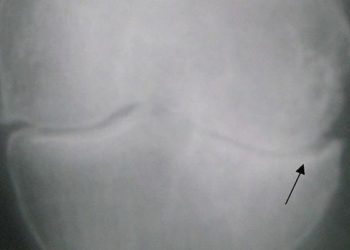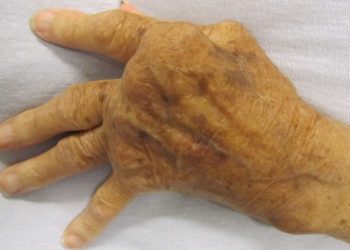Sodium-glucose cotransporter-2 inhibitors may decrease incidence of recurrent gout flares
1. Over a one-year period, the incidence of recurrent gout flares in patients with gout and diabetes was significantly lower in those who initiated sodium-glucose cotransporter-2 inhibitor (SGLT2i) treatment compared to other antidiabetic treatments.
2. Patients who initiated an SGLT2i experienced a lower risk of all-cause mortality relative to the comparison cohort.
Evidence Rating Level: 2 (Good)
Study Rundown: Gout, the most common inflammatory arthritis, has exhibited rising prevalence and incidence globally. Despite available effective treatments, recurrent gout flares persist, causing significant pain and morbidity. Gout’s association with cardiovascular-metabolic conditions adds to its comorbidity burden, and studies highlight its increased risk of kidney and cardiovascular-related mortality. Current guidelines advocate long-term urate-lowering therapy (ULT) to prevent flares, but previous studies indicate inadequate ULT dosing and low ULT adherence. Sodium-glucose cotransporter-2 inhibitors (SGLT2i), used to treat type 2 diabetes, show promise in reducing cardiovascular events and all-cause mortality, lowering serum urate levels, and reducing the risk of incident gout, yet their effects on recurrent gout flares and mortality in gout patients remain unstudied. Data from the IQVIA Medical Research Database (IMRD) in the UK was used to compare the risk of recurrent gout flares and all-cause mortality between patients initiating SGLT2i treatment and those initiating other antidiabetic medications in patients with gout and type 2 diabetes. The overall incidence of recurrent flares, the incidence of the first recurrent flare, and all-cause mortality were found to be significantly lower in the SGLT2i cohort than in the comparison cohort.
Click to read the study in JAMA Network Open
In-Depth [retrospective cohort]: Despite effective available treatments like ULT, many patients with gout continue to experience recurrent gout flares. Gout is also associated with an increased mortality risk from kidney and cardiovascular disease. SGLT2i has been shown to mitigate all-cause mortality risk, decrease urate levels, and reduce the risk of incident gout. This study aimed to determine the association between SGLT2i and recurrent gout flares along with all-cause mortality in patients with gout. From the IMRD, 5931 eligible patients with gout and diabetes were analyzed to compare the risk of recurrent gout flares and all-cause mortality in patients initiating SGLT2i and those initiating other antidiabetic medications. Of these patients, 1548 (mean [SD] age, 61.8 [10.6] years; 16.0% women) had initiated SGLT2i treatment, while 4384 patients (mean [SD] age, 67.5 [11.6] years; 24.6% women) had initiated treatment with the active comparators of glucagonlike peptide-1 receptor agonists (GLP-1 RA) or dipeptidyl peptidase-4 inhibitors (DPP-4i). Compared to the comparison cohort, patients in the SGLT2i cohort exhibited a decreased incidence of recurrent flares with a rate difference (RD) of −20.4 (95% CI, −39.6 to −1.2) per 1000 person-years and risk reduction (RR) of 0.79 (95% CI, 0.65-0.97). These associations were consistent across different subgroups. In addition, SGLTi initiation was associated with a 19% lower weighted incidence rate of the first recurrent flare and a weighted hazard ratio (HR) 0.81 (95% CI, 0.65-0.98). Finally, all-cause mortality was found to be 29% lower in the SGLT2i cohort than in the comparison cohort with a HR of 0.71 [95% CI, 0.52-0.97]. This lower risk of all-cause mortality was mainly observed when comparing initiators of DPP-4i (HR, 0.63 [95% CI, 0.48-0.84]) but not GLP-1 RA (HR, 1.12 [95% CI, 0.89-1.52]). Overall, these findings suggest in patients with gout and type 2 diabetes treatment with SGLT2i is associated with a lower risk of recurrent gout flares and lower all-cause mortality.
Image: PD
©2023 2 Minute Medicine, Inc. All rights reserved. No works may be reproduced without expressed written consent from 2 Minute Medicine, Inc. Inquire about licensing here. No article should be construed as medical advice and is not intended as such by the authors or by 2 Minute Medicine, Inc.









